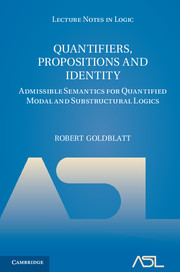 Quantifiers, Propositions and Identity
Quantifiers, Propositions and Identity Book contents
CHAPTER 5 - IDENTITY
Published online by Cambridge University Press: 07 September 2011
Summary
We now extend our language for quantified modal logic by adding a predicate symbol ≈ for an identity relation, allowing us to express assertions about the identity of individuals. A two-sorted language is developed, with one sort of term standing for individual concepts, represented as partial functions from worlds to individuals, and the other sort specialising to concepts that are rigid, i.e. have the same value in accessible worlds. The identity predicate allows the existence predicate ε to be defined, taking ετ to be the self-identity formula τ ≈ τ, whose corresponding proposition/truth set is the domain of the partial function interpreting τ. The use of admissibility is extended from propositions to individuals by requiring each model to have a designated set of admissible individual concepts, within which there is a designated set of admissible rigid ones.
We axiomatise the set of formulas that are valid in these models, using a new inference rule that allows deduction of assertions of non-existence (¬ετ). The logic characterised by Kripkean models is then treated separately. The final section of the chapter gives a semantic analysis of Russelian definite description terms ιx.ϕ in this context, and shows how to construct canonical models and axiomatisations for logics in languages that have these description terms as well as the identity predicate.
- Type
- Chapter
- Information
- Quantifiers, Propositions and IdentityAdmissible Semantics for Quantified Modal and Substructural Logics, pp. 159 - 202Publisher: Cambridge University PressPrint publication year: 2011


